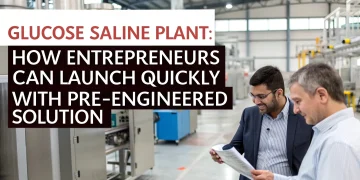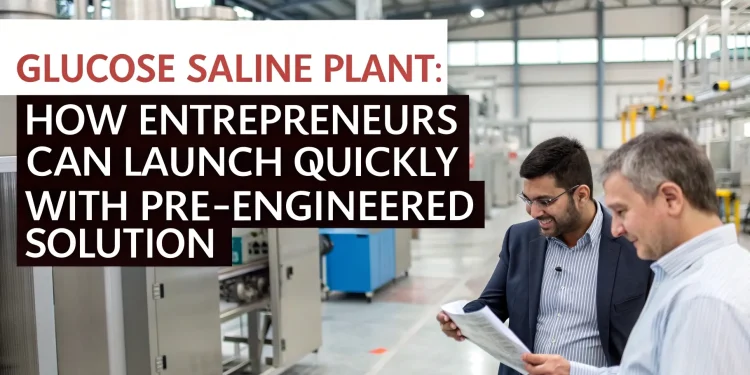In today’s world wherein people are more concerned about their health than ever before, the use of intravenous (IV) fluids glucose saline in particular, has grown rapidly. Glucose saline solutions used for rapid hydration, nutrient supplementation, and during medical emergencies are ubiquitous in the healthcare system. Their availability is critical at all levels of healthcare—from hospitals and clinics to disaster relief centers and field medical camps. Investors and entrepreneurs looking to make a mark in the pharma or healthcare manufacturing domain, setting up a glucose saline manufacturing facility is a socially responsible business venture given the ever-increasing demand.
Previously, glucose saline manufacturing units required meticulous planning and years of infrastructure development along with labor compliance, and complicated formalities. These days, however, project implementation is made effortless through turnkey solutions. Offering more flexibility and reduced resource commitments, turnkey projects offer everything like plant designing, machinery installation, regulatory support, and operational training under one roof. This allows business-minded individuals to start running without hurdles.
This article will discuss how entrepreneurs can optimally use turnkey solutions to set up a glucose saline manufacturing unit that is compliant with international pharma standards.
Glucose Saline and Its Importance in Healthcare
Like Dextrose Saline or Dextrose Normal Saline, Glucose saline is an intravenous solution in which glucose (in a concentration of 5% or 10%) is added to sodium chloride (0.9%). It is given for fluid loss, for giving important sugars (dextrose) needed for energy and also for electrolyte balance in dehydration, post-surgery, trauma, and in chronic illness.
Due to its diverse use in pediatric, adult, and geriatric care, glucose saline is a common stock item in hospitals, emergency units, maternity homes, and even pet clinics. In addition to these factors, there has been increasing demand for IV fluids owing to a rise in surgical procedures, heightened awareness of preventive healthcare, and expansion of rural health services under government programs in emerging economies, particularly India.
The segment of glucose saline is relatively immune to economic downturns, receiving steady attention from both state and private healthcare institutions. This indicates a strong potential for investment from future-oriented businessmen.
Reasons Why a Turnkey Project is Ideal for Glucose Saline Plant Setup
Setting up a pharmaceutical-grade plant for glucose saline manufacturing requires an integration of technology, compliances, microbiological control, HVAC, sterile filling lines, and validation protocols among others. This complexity is often a hindrance to beginners wanting to venture into the space. In contrast, turnkey projects provide a solution by giving an all-in-one package that includes:
- Construction of the facility including its layout and architectural design to comply with WHO-GMP and cGMP
- Acquisition and installation of machinery to include solution preparation, filling, sterilization, and packaging
- HVAC, clean room and water treatment systems
- Validation documents as well as DQ/IQ/OQ/PQ protocols
- Operational and full staff training
- Clear bureaucratic administrative licensing and regulations
There is an array of ergonomic aids given in the market by experts with vast experience in servicing pharmaceutical liquids and these helps smoothen the workflow and enhance productivity. Such guidance ensures entrepreneurs mitigate delays, cost over expenditure, and technical malfunctions problems and can operate collaboratively within 6–12 months from the starting of the project.
Related: Launching a Profitable IV Fluid Manufacturing Venture with BFS Technology
Key Components of a Turnkey Glucose Saline Plant
A glucose saline manufacturing unit typically includes the following core areas:
Raw Water Treatment Plant
Converts tap or bore well water into pharma-grade purified water with the use of RO, UV, ozone, and deionization. This is critical for pharma grade IP/BP/USP standards.
Solution Preparation Area
Dissolving glucose and sodium chloride in purified water is done in 316L grade stainless steel tanks with conditionally automated systems, including agitators, load cells, and temperature control. The solution is filtered and move includes transferring purified glucose saline solutions to holding tanks in a sterile manner.
Filling and Sealing Zone
Non-PVC or PVC bottles/pouches of various sizes (100ml, 250ml, 500ml, or 1000ml) are filled with glucose/saline using automatic form-fill-seal (FFS) machines or blow-fill-seal (BFS) systems. Minimal human intervention ensures aseptic filling is done through these automated machines.
Sterilization and Leak Testing
Overpressure sterilizers are used to autoclave filled syringes, removing all microbial content. Seal integrity and sterility are examined by leak testers.
Packing and Labeling Section
In this section, the bottles are labeled and batch-coded, afterwards being packed in cartons and palletized for dispatch. The packing lines may be semi-automatic or fully automatic, which depends on the plant capacity.
HVAC and Cleanroom Systems
Positive pressure zones with HEPA filters and controlled air handling systems ensure maintenance of ISO Class 7 or 8 cleanroom classifications in critical areas.
Quality Control and Microbiology Lab
Every batch of a drug has to go through multiple tests of pH, conductivity, endotoxins, sterility, particulate matter, and pyrogens, ensuring they meet the pharmacopeial standard.
A turnkey project integrates all components into one cohesive system and is structured to facilitate easy verification as well as smooth scaling up.
Cost of Setting Up a Glucose Saline Plant via Turnkey Route
The overall investment is contingent on factors such as plant output, degree of automation, type of containers (glass, PVC, or non-PVC), and BFS or FFS technology employed. Below is an outline of the estimated expenditure:
- Small scale plant (2,000 bottles/hour): ₹5 to ₹8 crore
- Medium scale plant (5,000 bottles/hour): ₹12 to ₹18 crore
- Large scale plant (10,000 bottles/hour and above): ₹25 crore+
The estimates above incorporate civil works, machinery, construction of the cleanroom, HVAC, utilities, and working capital. The costs are optimized through the turnkey model using a single vendor, reducing delays, and providing discounts on bundled machinery and components.
The funding can be sourced through bank loans and government initiatives such as Credit Linked Capital Subsidy (CLCSS) and PMEGP. At the same time, subsidies or lower lease rentals may be accessible from state-level pharma parks.
Related: Business & Investment Opportunity in Manufacturing of Glucose Saline.
Licensing and Regulatory Compliance
Designing and implementing controls for pharmaceutical injectables like glucose saline pumps mandatorily require quality compliance to regulatory standards. Usually, a turnkey provider helps clients on:
- FDA layout approvals
- GMP & WHO-GMP documentation
- Site master file and validation protocols
- Environmental clearance, fire safety approvals
- Drug manufacturing license Form 25 & 28
- Assistance with CDSCO registration for Export Oriented Units
In these compliance-driven domains, everything is customization but partners guarantee that the plant operates within the Indian ecosystem, as well as international standards which make the product completely export-ready from the first day of operations.
Prospective Marketing, Sales, and Distribution
After operation of backbone support systems is completed, focus on operations initiates and marketing drives profitability. Glucose saline’s market capitalization is considerably broader expanding to:
- NGO’s and disaster relief groups
- Private multifunctional clinics and hospitals
- Diagnostic centers, Pathology labs
- Government hospitals along with their health divisions
- Rural healthcare camps along with veterinarian hospitals
- Exporters from the Middle East, along with South-East Asia and Africa
Manufacturers have the discretion of either maintaining their personal brand or assuming the role of third-party contract manufacturers. Institutional contracts paired with long-term supply agreements alongside white labeling for NGOs or governmental departments ensure stable cash flows.
This is useful for branding within retail chain pharmacies and privately labeled hospital pharmacies. Sales representatives or distribution partners will be more effective in these verticals.
Conclusion: A Turnkey Way to Fast-Track Your Entry in the Pharma Space
The glucose saline business is one of the most accessible and scalable pharmaceutical manufacturing opportunities for new entrepreneurs. It combines steady market demand, low product complexity, and long-term relevance in global healthcare systems.
Turnkey projects eliminate the typical obstacles faced during plant setup, allowing you to focus on business development and operational excellence. With a pre-engineered solution, compliance-ready layout, and expert execution, entrepreneurs can start production in record time while ensuring that every batch meets the highest standards of safety and efficacy.
If you’re ready to take a step into pharmaceutical manufacturing with clarity and confidence, a turnkey glucose saline plant could be your ideal launchpad.
Niir Project Consultancy Services (NPCS) provides detailed turnkey project reports, plant layout plans, machinery selection, regulatory documentation, and financial modeling support for setting up glucose saline and IV fluid manufacturing units across India and abroad.


















